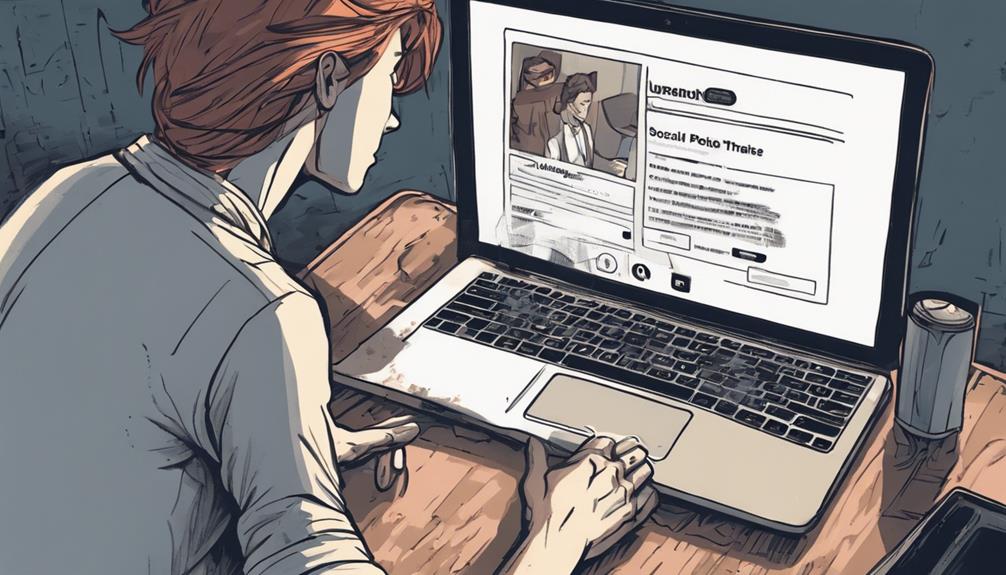As we delve into the complex maze of a narcissist’s reaction to the end of their pursuit, we discover an array of strategic moves and emotional disturbances that ensue.
The initial shockwave of disengagement often sets off a chain reaction of unpredictable behaviors, leaving us to ponder the true intentions lurking beneath the surface.
The unveiling of these intricate layers provides a glimpse into the psyche of the narcissist, shedding light on the complex interplay of power dynamics and psychological manipulation.
Stay tuned as we unravel the nuances of their reactions, offering insights into the enigmatic world of narcissistic behavior.
Key Takeaways
- Narcissists may react with anger and manipulation to regain control.
- Cutting off contact can lead to initial relief but potential backlash.
- Recognize manipulative tactics like gaslighting and love bombing.
- Recovery involves therapy, support networks, and setting healthy boundaries.
Immediate Narcissistic Reaction
In the immediate aftermath of ending pursuit with a narcissist, their initial reaction often involves a mixture of shock, disbelief, and attempts to regain control through manipulation tactics.
It's a tumultuous time where the narcissist's carefully constructed facade begins to crumble, and they scramble to maintain the power they feel entitled to. This phase can be emotionally charged, with the narcissist resorting to various strategies to shift blame, instill guilt, or even display anger and aggression.
Understanding this immediate response is crucial in preparing oneself for the storm of manipulative behaviors that may follow. It's a delicate dance between asserting boundaries and protecting one's emotional well-being while navigating the turbulent waters of a narcissist's wounded ego.
Manipulative Control Tactics

Navigating the aftermath of ending pursuit with a narcissist unveils a web of manipulative control tactics designed to reel back in the power they perceive slipping away. These tactics are cunning and manipulative, aiming to regain dominance and control over the situation.
- Gaslighting: Distorting reality to make you doubt your own perceptions and memory.
- Triangulation: Creating jealousy and competition by involving a third party.
- Love bombing: Overwhelming with excessive affection and attention to manipulate emotions.
These tactics can be emotionally draining and confusing, making it essential to recognize and protect yourself from falling back into their control.
Emotional Turmoil and Outbursts
Experiencing emotional turmoil and outbursts after ending pursuit with a narcissist can be overwhelming and tumultuous, revealing the depth of manipulation and control tactics employed. In this challenging phase, individuals often find themselves navigating a rollercoaster of feelings, from profound sadness and confusion to intense anger and frustration. The narcissist's sudden shift in demeanor, from charm to hostility, can leave one feeling emotionally drained and mentally exhausted. Below is a table illustrating the common emotional responses one might encounter when disengaging from a narcissistic individual:
| Emotional Response | Description |
|---|---|
| Sadness | Feeling of deep sorrow and grief. |
| Anger | Frustration and rage towards the narcissist's behavior. |
| Confusion | State of disorientation and uncertainty about the relationship. |
Defensive Strategies and Blame

When faced with disengaging from a narcissist, individuals often employ defensive strategies and resort to blaming themselves as a means of coping with the tumultuous aftermath. It's natural to feel overwhelmed and uncertain during this challenging phase.
Here are some common responses observed in such situations:
- Engaging in self-doubt and questioning our actions.
- Feeling the need to justify the narcissist's behavior to protect our self-esteem.
- Internalizing the blame for the relationship's difficulties.
These reactions stem from a deep emotional turmoil and the intricate web of manipulation woven by the narcissist. Remember, it's essential to practice self-compassion and seek support during this process of disentanglement.
Seeking External Validation Sources
In our quest for external validation, we often unknowingly seek affirmation from sources outside ourselves, inadvertently fueling the narcissist's need for control and admiration. This behavior plays into the narcissist's desire for constant attention and validation, reinforcing their inflated sense of self-importance. By relying on external sources for validation, we inadvertently give the narcissist power over our self-worth and confidence. Below is a table highlighting common external validation sources that feed into a narcissist's need for admiration and control:
| External Validation Sources | Description | Impact |
|---|---|---|
| Social Media Likes | Seeking approval | Boosts ego |
| Flattery from Others | Validation of worth | Reinforces superiority |
| Material Possessions | Display of status | Fuels sense of entitlement |
| Achievements | Recognition | Validates self-importance |
| Romantic Partners | Admiration | Satisfies need for admiration |
Psychological Warfare and Gaslighting

Understanding the insidious tactics of psychological warfare and gaslighting is crucial in unraveling the manipulative dynamics of narcissistic relationships. In these toxic interactions, the narcissist's use of psychological manipulation can leave lasting scars on our mental well-being.
Here are some key points to consider:
- Gaslighting can distort our perception of reality, making us doubt our own thoughts and feelings.
- Triangulation may lead to feelings of jealousy and insecurity as the narcissist pits us against others.
- Love bombing can create a false sense of intimacy and trust, only to be used as a tool for manipulation.
These tactics can be subtle yet damaging, eroding our self-confidence and sense of reality. It's essential to recognize these behaviors to protect ourselves from further harm.
Retaliation and Vindictive Behavior

Navigating the aftermath of cutting off contact with a narcissist can often reveal their propensity for retaliation and vindictive behavior. It's crucial to anticipate potential reactions as a form of self-protection. Narcissists may resort to various vindictive actions, such as spreading rumors, launching smear campaigns, or even sabotaging your relationships or career. Here's a breakdown of possible retaliatory behaviors:
| Retaliatory Behavior | Description | Impact on Individual |
|---|---|---|
| Smear Campaigns | Spreading false information to harm reputation | Emotional distress and social isolation |
| Sabotaging Relationships | Intervening in relationships to cause harm | Trust issues and emotional turmoil |
| Career Interference | Damaging professional opportunities | Financial instability and stress |
Understanding these potential behaviors can help in preparing emotionally and strategically for any retaliation from the narcissist.
Feigned Remorse and Apologies

Feigning remorse and offering insincere apologies, narcissists manipulate emotions to maintain control and elicit sympathy. In their calculated attempts to appear remorseful, they aim to deceive and emotionally manipulate those around them. This tactic serves their need for power and control, rather than genuine regret for their actions.
Here are three common ways narcissists use feigned remorse and apologies:
- Apologizing without acknowledging specific wrongdoings.
- Using apologies as a tool to avoid consequences.
- Demonstrating temporary remorse to regain trust and control.
Understanding these manipulative tactics can help individuals see through the facade and protect themselves from further emotional harm.
Intermittent Reinforcement of Affection

Experiencing intermittent reinforcement of affection from a narcissist can create a cycle of uncertainty and emotional turmoil. The sporadic nature of their affectionate gestures keeps us constantly on edge, hoping for more while never knowing when it will come.
This pattern plays with our emotions, making us crave their validation and attention even more intensely during these rare moments of warmth. We may find ourselves questioning our worth and desirability, seeking to understand what we did to deserve both the affection and the withdrawal.
This push and pull dynamic can be incredibly destabilizing, leaving us vulnerable to their manipulative tactics and unable to break free from their hold on our emotions.
Potential for Hoovering and Reconciliation

After enduring the destabilizing cycle of intermittent reinforcement of affection, individuals may find themselves vulnerable to the narcissist's potential hoovering and attempts at reconciliation, further complicating the healing process.
- The allure of familiar patterns and false promises can cloud judgment.
- Feelings of loneliness or longing for the idealized version of the narcissist may arise.
- Doubts about one's decision to break free might surface, leading to inner turmoil.
Navigating these emotions requires self-compassion and a steadfast commitment to personal growth. Recognizing hoovering tactics and prioritizing emotional well-being are crucial steps towards breaking free from the cycle of toxicity. Remember, healing is a journey, and it's okay to seek support along the way.
Frequently Asked Questions
How Can One Distinguish Between Genuine Remorse and Feigned Apologies From a Narcissist After Ending Pursuit?
When navigating post-breakup interactions with a narcissist, discerning between authentic remorse and manipulative apologies is crucial. Watch for consistent actions matching words, genuine accountability, and efforts towards positive change. Trust intuition and seek support.
What Are Some Subtle Signs of Psychological Warfare and Gaslighting That May Go Unnoticed in a Narcissist's Response to Rejection?
In a narcissist's response to rejection, subtle signs of psychological warfare include invalidating our feelings, twisting reality, and planting doubt. These tactics sow confusion and erode our self-trust, making it crucial to recognize and protect ourselves.
How Do Narcissists Manipulate External Validation Sources to Maintain Their Self-Image and Control Over Others?
In our quest for control, we manipulate external validation sources to sculpt our self-image. We craft illusions of desirability and power, seducing with charisma and guile. Our hunger for admiration is insatiable.
What Are the Long-Term Effects of Intermittent Reinforcement of Affection From a Narcissist on the Individual's Emotional Well-Being?
Intermittent reinforcement of affection from a narcissist can lead to confusion, self-doubt, and emotional turmoil. It creates a cycle of highs and lows, impacting trust and self-esteem. Recognizing this pattern is crucial for healing and setting boundaries.
Is There a Pattern or Timeline to Watch for When Considering the Potential for Hoovering and Reconciliation From a Narcissist After Cutting off Contact?
Watching for hoovering from a narcissist post no-contact may reveal a predictable cycle of charm, manipulation, and control attempts. The irony lies in the pattern's predictability, contrasted with the chaos of emotions it stirs.
What is the Narcissist’s Response to Sudden Silence in a Relationship?
When faced with sudden silence in a relationship, a narcissist’s response to decoding sudden silence mystery may involve manipulation tactics, such as gaslighting or blame-shifting. They may become angry or distant in an attempt to regain control and avoid feeling vulnerable. Understanding their behavior can help in setting healthy boundaries.
Conclusion
In conclusion, navigating the aftermath of ending pursuit with a narcissist can be a challenging yet transformative journey.
One interesting statistic to consider is that studies have shown that approximately 75% of individuals who've been in relationships with narcissists report experiencing emotional abuse.
This statistic highlights the pervasive impact of narcissistic behaviors on those involved, underscoring the importance of recognizing manipulative tactics and seeking support for healing and recovery.









